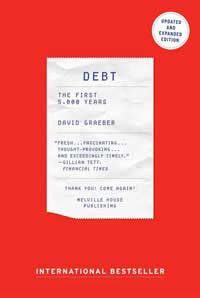 560 pages
560 pages15 CE credits
Course Enrollment
$270.00
Add to Cart
All exams are taken online. The exam for this course will be available in "My Courses" immediately upon enrollment. Note the book is not included.
The book is available for purchase from Amazon.
As an Amazon Associate we receive a rebate from qualifying purchases.
DEBT
The First 5,000 Years
David GraeberMelville House, 2014
DESCRIPTION
Here anthropologist David Graeber presents a stunning reversal of conventional wisdom: he shows that before there was money, there was debt. For more than 5,000 years, since the beginnings of the first agrarian empires, humans have used elaborate credit systems to buy and sell goods–that is, long before the invention of coins or cash. It is in this era, Graeber argues, that we also first encounter a society divided into debtors and creditors.
Graeber shows that arguments about debt and debt forgiveness have been at the center of political debates from Italy to China, as well as sparking innumerable insurrections. He also brilliantly demonstrates that the language of the ancient works of law and religion (words like "guilt," "sin," and "redemption") derive in large part from ancient debates about debt, and shape even our most basic ideas of right and wrong. We are still fighting these battles today without knowing it.
The reader will be able to:
• Define what is meant by 'the myth of barter'
• Explain how debt preceded money
• Demonstrate reasoning that the national markets are a governmental construct
• Discuss how debt was first a social contract
• Outline the historical research that shows money was invented to quantify certain kinds of debt
• Demonstrate how monetary policy and social policy are intricately entwined
• Describe how money emerged as monarchs needed to pay soldiers and is linked to slavery
• Recognize how the Axial Age emphasized the quantification of debt, debt peonage and slavery
• List some parameters of the social nature of debt during the Middle Ages and why there was less debt peonage
• Describe how the Capitalistic Age returned to the quantfication and systems of slavery and debt peonage
• Discuss why now we see a resistance toward debt peonage and the dominance of financiers and banks
• Evaluate why it may not be necessary to borrow money from a bank to start one's life
AUTHOR
David Graeber teaches anthropology at the London School of Economics. He has written for Harper's, The Nation, Mute, and The New Left Review. One of the original organizers of Occupy Wall Street, Graeber has been called an "anti-leader of the movement" by Bloomberg Businessweek.
EDITORIAL REVIEWSWinner of the Bateson Book Prize awarded by the Society for Cultural Anthropology
"One of the years most influential books. Graeber situates the emergence of credit within the rise of class society, the destruction of societies based on webs of mutual commitment and the constantly implied threat of physical violence that lies behind all social relations based on money." Paul Mason, The Guardian
"The book is more readable and entertaining than I can indicate... It is a meditation on debt, tribute, gifts, religion and the false history of money. Graeber is a scholarly researcher, an activist and a public intellectual. His field is the whole history of social and economic transactions."
--Peter Carey, The Observer
"An alternate history of the rise of money and markets, a sprawling, erudite, provocative work."
--Drake Bennett, Bloomberg Businessweek
"[A]n engaging book. Part anthropological history and part provocative political argument, it's a useful corrective to what passes for contemporary conversation about debt and the economy."
--Jesse Singal, The Boston Globe
"Fresh... fascinating... Graebers book is not just thought-provoking, but also exceedingly timely."
--Gillian Tett, Financial Times (London)
"Remarkable."
--Giles Fraser, BBC Radio 4
"Terrific... In the best anthropological tradition, he helps us reset our everyday ideas by exploring history and other civilizations, then boomeranging back to render our own world strange, and more open to change."
--Raj Patel, The Globe and Mail
"Graeber's book has forced me to completely reevaluate my position on human economics, its history, and its branches of thought. A Marxism without Graeber's anthropology is beginning to feel meaningless to me."
--Charles Mudede, The Stranger
"The world of borrowing needs a little demystification, and David Graeber's Debt is a good start."
--The L Magazine
"Controversial and thought-provoking, an excellent book."
--Booklist
"This timely and accessible book would appeal to any reader interested in the past and present culture surrounding debt, as well as broad-minded economists."
--Library Journal
ISHK CE at Home
1702-L Meridian Ave., #266
San Jose, CA 95125-5586
This website uses cookies to ensure you get the best experience on our website. Learn more
